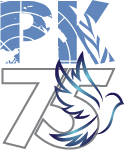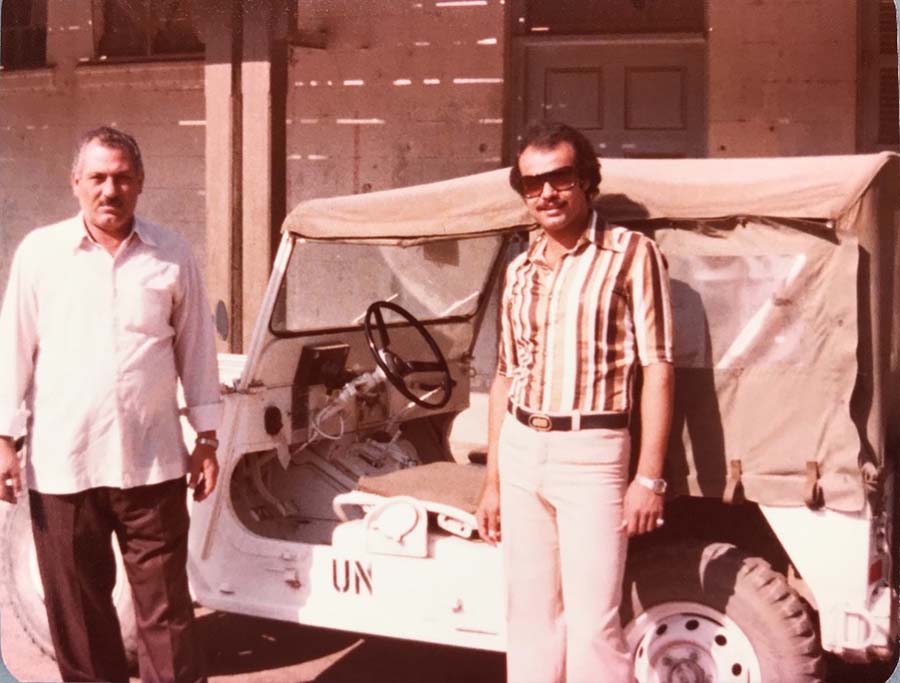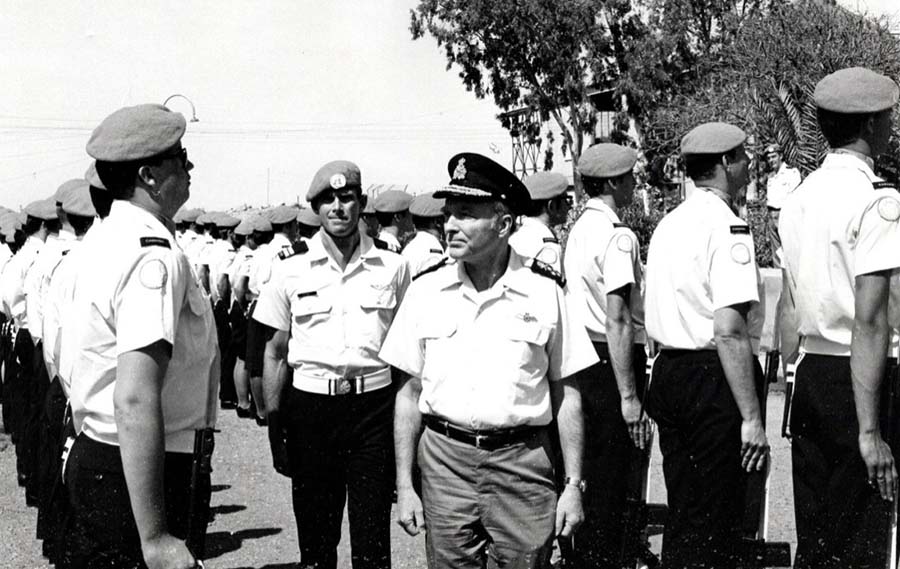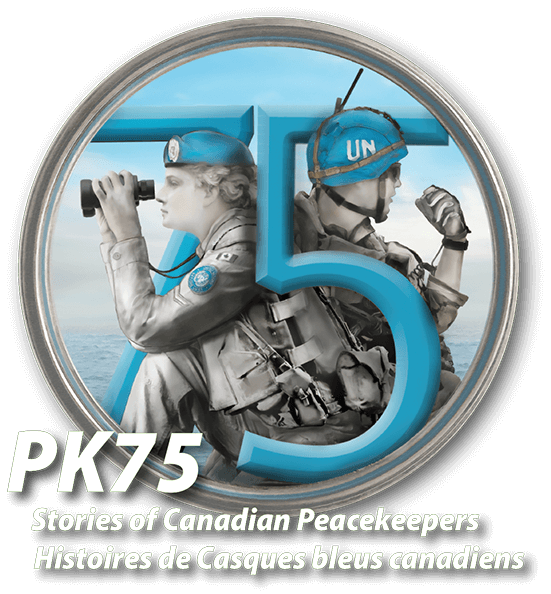

I arrived in Ismailia Egypt in January 1978 to serve a six-month tour as the Staff Officer Administration with the Canadian Contingent Headquarters. Canada was responsible for service support, communications support, and air support to the four deployed United Nations Battalions in the Sinai and the wider UN and Canadian Forces in the Near East.
UNEF II was the first deployment where Canadian servicewomen served in significant numbers. There were approximately 75 women on strength in Ismailia and they were accommodated in separate quarters that came to be known as ‘Bra Batt’ or ‘Bra Battalion’. It was all in good fun at the time, however today this would not be tolerated. The civilian employees working in the women’s quarters were all Egyptian females.
My primary task was to manage the Egyptian civilian workforce. There were approximately 260 civilians who came into our camp daily to perform a number of necessary functions. The Contingent employed two Egyptian civilian personnel managers who did all the hiring for us. We had to place an enormous amount of trust in these two individuals as cultural and language issues meant we couldn’t get as close to the process as we would have normally.
I was assigned the duty of Escort Officer for the visit of the CDS Admiral Falls, a trip that would take him to Egypt, Israel, and Syria. It was rightly decided that it would not do for the CDS to have to drive across the Sinai with his entourage, so the plan was to fly him from Cairo to Jerusalem in his VIP aircraft. This meant that I had to take his vehicle convoy of five vehicles across the Sinai at night to arrive at the Jerusalem airport in time for his arrival the next morning at 0900. It is not an impossible drive as the distances are short, however, one must cross the Suez Canal before heading into the desert. The Egyptian Army was responsible for putting bridges in across the canal at three points on a timed schedule daily, but one could never count on them being on time.
It just so happened that they didn’t put the bridge in at our chosen crossing site on the day of our journey until almost dark. Our hope was to get halfway across the desert before darkness descended but it wasn’t to be. Once we had crossed the Suez Canal, we had to move through Egyptian Army positions, then UN positions in the heart of the desert and lastly Israeli positions. I led the convoy with one driver and each of the following four cars had just a driver in them. We all had UN identification cards that were our passport into most countries in the region.
In the dark, we approached an Egyptian check point and were stopped by a young conscript soldier who was terrified. He immediately stuck his AK 47 assault rifle through my driver’s window and started to mutter away in Arabic which of course we couldn’t understand. We got him settled down, but he wouldn’t let us through the barrier despite us having shown him our UN ID. I tapped my rank badges and said to him a few times “Officer, Officer, Officer”. He finally understood and called his Officer on a field telephone. The Officer arrived, he did speak some English, and he was obviously aware of the protocol with respect to UN personnel having freedom of movement, and he let us through. I have to admit there were a few scary moments when that AK was thrust through the window into our faces, but it ended well.
We made quick time through the UN zone and as we were entering the Israeli sector the road disappeared into a sand dune. A few days prior, a monster sandstorm had whipped through the Sinai, including Ismailia, and the Israelis had yet to open up the road in their sector. After being stopped for a few minutes with our headlights on, we were approached by two Israeli Armoured Personal Carriers (APCs). We explained our plight to the occupants, and they immediately offered to help. In the pitch black they hooked our vehicles up to a tow chain on the APCs and they literally dragged each of our vehicles, in turn, through the sand. Without a doubt they saved our bacon as we would still be sitting on the wrong side of the sand dune if they hadn’t come to our rescue. For their efforts we gave them all the soft drinks and cigarettes that we could spare, and they were pleased.
Unknown to us as we approached the Israeli border, was that the afternoon before the Palestinians had ambushed an Israeli bus on the Haifa Highway with considerable loss of life. The Israelis had placed a ring of steel on their borders, and we were greeted by several halftrack vehicles with .50 calibre machine guns mounted on them. It was first light, so getting through the border was not an issue, but it was the first time we had seen some of the might of the Israeli Defence Forces. (A couple of months later I was on the Golan Heights visiting the Canadians there on the night the Israelis invaded Southern Lebanon. Masses of armoured vehicles were strung out on all roads in advance of the invasion. A battery of six 175-millimetre Artillery pieces was positioned across the road from our UN camp, so we knew precisely when the operation kicked off; the earth did move!)
We arrived at our Hotel in Jerusalem in time for a quick shower, shave, and change of uniforms and we managed to get to the airport with 30 minutes to spare. The remainder of the CDS’ trip went as planned and I had an opportunity to spend some time with an old Airborne buddy from Edmonton, Pierre Lamontagne (RIP), who was the CDS’ aide de camp. Thankfully, the journey back to Ismailia was comparatively swift and uneventful, while the outbound trip gave the six of us a lifetime memory.
Biography
Walter Holmes is a career soldier with 56 plus years in uniform. After service with the Army Cadets and Militia in his hometown of London, ON, he applied and was accepted into the Canadian Army Officer Candidate Program as an Officer Cadet. After a year of tough training at the Royal Canadian Infantry School in Camp Borden, he was commissioned into The Royal Canadian Regiment in September 1967 as a 2nd Lieutenant.
What followed was a career with most of the time spent in command. Command at Platoon, Company, Battalion, Regiment, Base, Brigade, Land Area and Division levels, the latter a NATO Multi-National command as Commander Allied Command Europe Mobile Force (Land), provided challenges but equal measures of fun with the highlights being the opportunity to work and serve with the very best soldiers in the world. Staff positions at Battalion, Army, and Corps levels, a tour as the Canadian Military Attaché in the Canadian Embassy in Washington D.C., and a three-year teaching task at the Canadian Army Staff College in Kingston rounded out the balance of his 37 years of Regular Force service. Walter is a graduate of the Canadian Army Staff College, the Canadian Forces College, and the United States Army War College. One of his claims to fame is he has visited or exercised in North Norway 22 times, only once in summer.
Walter retired from the Regular Army in late 2002 and commenced a second career as a security/military consultant working with a variety of organizations in Canada, the Balkans, and Eastern Europe.
A five-year tour as Colonel of The Regiment, The Royal Canadian Regiment, is considered by Walter to be the highlight of his post service years. He followed four regimental battle groups in preparation for, and during their deployments to the Kandahar region of Afghanistan, including visits to the region on three occasions. He was appointed Colonel Commandant of the Royal Canadian Infantry Corps in August of 2013, providing him with another opportunity to be engaged in the business of soldiers and soldiering. He left this post in August 2016 and took up duties as Honorary Colonel of The Queen’s Own Rifles of Canada, the Regiment his father fought with during WW II in October 2016. He finally hung up his uniform for the final time in November 2021.
Walter is currently the co-chair of a committee that is organizing a reunion in Cyprus in 2024 to commemorate Canada’s 60-year commitment to UN Peacekeeping in Cyprus and the 50th Anniversary of the 1974 Cypriot War.
Walter was inducted into the Most Excellent Order of the British Empire as a Member (MBE) by Her Majesty Queen Elizabeth in 1986, and into the Order of St John of Jerusalem as a Serving Brother in 1999. He was awarded the United States Army Legion of Merit in the grade of Officer (LOM) in 1995, and the Grand Officer of the Order of Merit of the Grand-Duchy of Luxembourg in 2002. He was honoured to receive the Meritorious Service Medal (MSM) for his work as Colonel of The Regiment from the Governor General of Canada. He has Peace Keeping Medals for service in Cyprus and the Sinai, the Canadian Peacekeeping Medal and the Special Service Medal for NATO service and the Canadian Forces Decoration with four Bars.
Walter and his wife Lana are retired and live in Kingston, ON. They enjoy their family, friends, and every opportunity for an adventure.

The Civilian Personal managers in Ismailia, both named Mohamed.

The CDS’ Quarter Guard, Admiral Falls, Camp El Gala, Ismailia. As Guard Commander, I am escorting the CDS.


